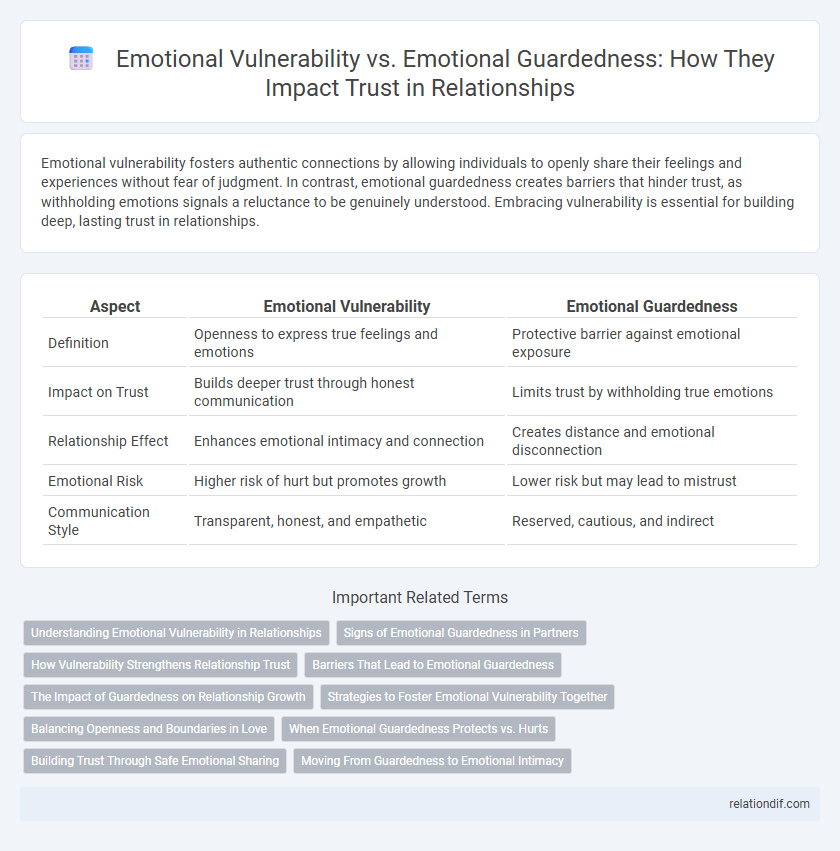Emotional vulnerability fosters authentic connections by allowing individuals to openly share their feelings and experiences without fear of judgment. In contrast, emotional guardedness creates barriers that hinder trust, as withholding emotions signals a reluctance to be genuinely understood. Embracing vulnerability is essential for building deep, lasting trust in relationships.
Table of Comparison
| Aspect | Emotional Vulnerability | Emotional Guardedness |
|---|---|---|
| Definition | Openness to express true feelings and emotions | Protective barrier against emotional exposure |
| Impact on Trust | Builds deeper trust through honest communication | Limits trust by withholding true emotions |
| Relationship Effect | Enhances emotional intimacy and connection | Creates distance and emotional disconnection |
| Emotional Risk | Higher risk of hurt but promotes growth | Lower risk but may lead to mistrust |
| Communication Style | Transparent, honest, and empathetic | Reserved, cautious, and indirect |
Understanding Emotional Vulnerability in Relationships
Emotional vulnerability in relationships fosters trust by allowing partners to express true feelings and fears without judgment, creating a deeper emotional connection. In contrast, emotional guardedness inhibits openness, often leading to misunderstandings and weakened bonds. Recognizing and embracing vulnerability is essential for building authentic, resilient relationships based on mutual empathy and support.
Signs of Emotional Guardedness in Partners
Partners exhibiting emotional guardedness often avoid deep conversations, with limited sharing of personal feelings and thoughts. They may display reluctance to express affection or discuss past experiences, leading to a barrier in emotional intimacy. Such signs include frequent defensiveness, hesitation to trust, and maintaining emotional distance even during significant relational moments.
How Vulnerability Strengthens Relationship Trust
Emotional vulnerability fosters deeper connection by encouraging openness and authenticity, which builds mutual trust in relationships. When individuals share their true feelings without fear of judgment, it creates a safe space for empathy and understanding to flourish. This openness contrasts with emotional guardedness, which often leads to distance and weakened trust due to hidden fears and unresolved tensions.
Barriers That Lead to Emotional Guardedness
Emotional guardedness often stems from past experiences of betrayal, rejection, or trauma that create barriers to trust. These barriers include fear of judgment, vulnerability, and potential emotional pain, leading individuals to withhold their true feelings. Overcoming emotional guardedness requires addressing these deep-seated fears and fostering environments of empathy and consistent support.
The Impact of Guardedness on Relationship Growth
Emotional guardedness can significantly hinder relationship growth by creating barriers to open communication and trust-building, leading to misunderstandings and emotional distance. When individuals withhold feelings to protect themselves, partners may feel disconnected, reducing intimacy and mutual support. Overcoming guardedness requires vulnerability, which fosters deeper emotional bonds and promotes a healthier, more resilient relationship dynamic.
Strategies to Foster Emotional Vulnerability Together
Building trust requires creating a safe environment where partners practice active listening and validate each other's feelings without judgment. Establishing consistent communication rituals and expressing empathy encourage emotional openness and reduce defensive guardedness. Shared vulnerability deepens connection, enabling mutual support and resilience within the relationship.
Balancing Openness and Boundaries in Love
Balancing emotional vulnerability and guardedness is essential for building trust in love, as openness fosters deep connection while boundaries protect personal well-being. Maintaining this equilibrium allows partners to share authentic feelings without fear of emotional harm, creating a safe space for mutual understanding. Effective communication and respect for each other's limits enhance trust, ensuring that emotional exposure is met with empathy rather than judgment.
When Emotional Guardedness Protects vs. Hurts
Emotional guardedness protects by creating boundaries that prevent psychological harm and preserve personal safety, especially after experiences of betrayal or trauma. However, excessive emotional guardedness can hinder authentic connections and erode trust, leading to isolation and misunderstandings. Finding a balance between vulnerability and self-protection is crucial for building resilient, genuine relationships.
Building Trust Through Safe Emotional Sharing
Emotional vulnerability fosters trust by creating an environment where individuals feel safe to express their true feelings without fear of judgment or rejection. In contrast, emotional guardedness often leads to barriers in communication and hinders the development of deep, meaningful connections. Building trust through safe emotional sharing involves active listening, empathy, and consistent support, which reinforce mutual understanding and strengthen relational bonds.
Moving From Guardedness to Emotional Intimacy
Moving from emotional guardedness to emotional intimacy requires building trust through consistent vulnerability and open communication. Emotional vulnerability fosters a safe environment where individuals feel understood and accepted, facilitating deeper connections and mutual empathy. Developing this trust reduces fear of judgment, allowing authentic expressions and stronger relational bonds.
Emotional vulnerability vs emotional guardedness Infographic

 relationdif.com
relationdif.com